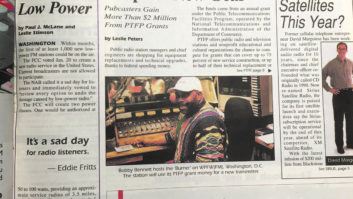
A recent article by Eliot Van Buskirk in the publication Evolver.fm raised an interesting suggestion: Should low-power FM stations consider building audience by letting listeners control what they hear, through community music sharing applications like Jelli or Roqbot?
Potentially we’ve got lots of new community stations on the way: The Federal Communications Commission plans to invite more license applications in accordance with the Local Community Radio Act, signed by President Obama last year.
Van Buskirk writes that he hopes this new wave of applicants will lead to “a flowering of weird and wacky local radio stations to deliver music and news to micro-communities across the country.”
Officially, LPFMs currently operate at 100 watts or less, giving them a maximum broadcast radius of only a few miles. According to Van Buskirk, this means that originality and variety will be key to attracting young, music-savvy listeners to these low-budget enterprises. He also believes that a decline of college radio stations may leave the market wide open.
Intriguing
So what would it look like if LPFMs started using an app via Web, mobile or social networking to allow listener control?
It’s a hypothetical that intrigues Michael Dougherty, CEO of Jelli, which was founded through a collaboration of Microsoft, Amazon and Yahoo! and uses a robot DJ called “T-Bone” to help listeners rally for the next song.
“We just love the idea of community radio,” he told Radio World. “It helped shape our original vision at Jelli of harnessing that passion with our user-controlled radio platform … allowing smaller communities shaped around longer-tail radio formats would be amazing.”
Others are more skeptical, for instance John Broomall, who with his wife Henri operates Grace Radio 103.7, WPCG(LP), from their home in Canton, Ga.
Founder of Christian Community Broadcasters, an LPFM advocacy and consulting organization, Broomall has also been the underwriting manager for an NCE TV station, WATC(DT) in Atlanta, for 16 years.
One incongruent aspect of Jelli for Broomall is the game-like format of the program, about which James Careless wrote for Radio World in December: Users “can push (song) choices to the top of the list by using one of the ‘rockets’ they received daily, or kill someone else’s choice by dropping a ‘bomb’ on it.”
Broomall expressed his reservations about this gladiatorial DJ style in an email to Dougherty: “More than half of all LPFMs are operated by Christian organizations. I don’t see Jelli being used to say that ‘The Old Rugged Cross’ ‘rocks’ while ‘Amazing Grace’ ‘sucks.’”
Forty-two percent of Jelli’s total base is pop music, but Dougherty says he sees the potential for LPFM stations to expand listeners’ musical horizons. “I am sure many under-served formats would work with LPFM,” he said. “Indie rock, punk rock, bluegrass, electronic music, jazz, heavy metal, etc.”
On the plus side for LPFMs, the setup and operating costs of using a program like Jelli are minimal. The company merely requires “a basic Linux server and broadcast card, and a persistent connection between the Internet (cloud) and the server,” Dougherty says. And it’s free for listeners.
This would come in handy for a station like Broomall’s, which voice tracks local news and weather and doesn’t even have a microphone on site.
On the minus (and it’s a big minus): Jelli’s current business model is centered on advertising. Dougherty acknowledges his company would have to develop a “new model for non-profit partners” before it could proceed with LPFM.
Still, the potential for partnership is there — hypothetically.
And let’s not forget about Roqbot, a social music app that won the SXSW accelerator contest last year. It lets patrons of a bar or restaurant crowd source the music selection via their smartphones (choosing from a pool of “approved” songs).
“I’m very open to creative models,” says Broomall. “It’s just you have to be really, really creative to make a model that works for a noncommercial station.”
Alexis Hauk is associate editor of Radio World.
Comment on this or any story. Write to [email protected]with “Letter to the Editor” in the subject field.











